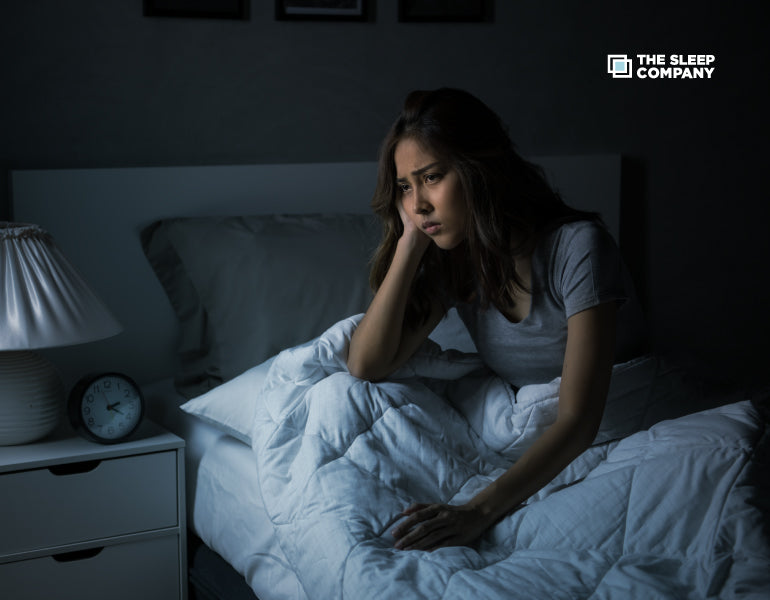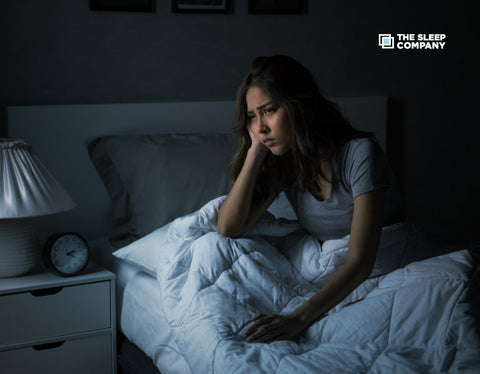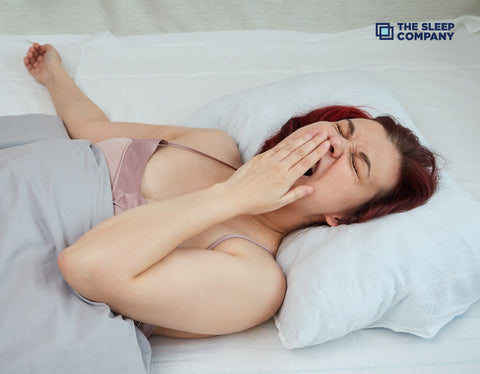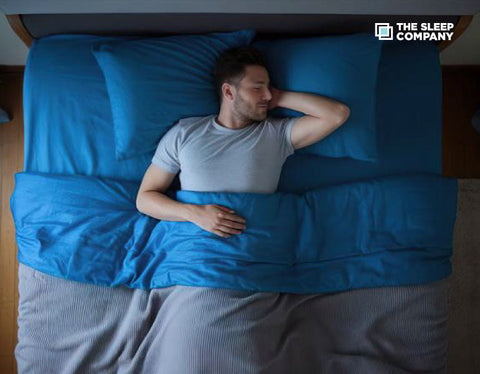My Cart

Somniphobia: Causes, Symptoms & Diagnosis

Understanding of Somniphobia
After a long day, finding restful sleep is a priority for most people. However, it's important to acknowledge that some individuals struggle with somniphobia, the fear of sleep. While not widely discussed, this phobia has profound effects on the mental and physical well-being of those affected. In this blog, we will delve into somniphobia, exploring its causes, symptoms, and other pertinent facts. Let's get started on understanding this complex and challenging condition.
What is Somniphobia?
Somniphobia, also known as hypnophobia, is fear of falling asleep or we can say fear related to sleep. In this phobia, a person feels a deep fear of falling asleep. Because of this fear, the person avoids sleeping which leads him/her to sleep deprivation. Someone with somniphobia experiences anxiety and uneasiness with the thought of sleeping. Although it is normal to have infrequent sleep concerns, somniphobia involves constant and extreme fear that adversely affects one’s life.
Causes of Somniphobia
The causes of somniphobia can vary from person to person. A person may observe different factors as beginning or triggering events. These factors can be:
1. Traumatic Events:
Several people may develop somniphobia after experiencing traumatic or scary events while sleeping, which trigger them. These traumatic events can be constant nightmares, sleep paralysis, or any other terrifying occurrence that creates fear of sleep in their mind.
2. Anxiousness:
Sometimes, any kind of anxiety, panic syndrome or post-traumatic stress disorder (PTSD) can be the reason a person develops somniphobia. The restlessness of not being able to control scary events during sleep can make a person somniphobiac.
3. Medical Conditions:
A few health conditions like Obstructive Sleep Apnea (OSA), insomnia, or any other sleep disorders can lead one to an irregular sleep pattern that eventually develops somniphobia.
4. Depression:
Those who suffer from depression may experience changes in their sleep patterns, including insomnia, which can lead to fear of sleeping at night.
5. Genetic Disorder:
Just like many problems such as anxiety, OSA or any other phobia, somniphobia can have a family history. It means if your family member has experienced this phobia, there are chances that you may also experience the same.
6. Usage Of Substances:
Consumption of substances like caffeine or any specific medicine intake can lead to abrupt sleep patterns, leading to uneasiness about sleep.
Symptoms of Somniphobia
Identifying the symptoms of somniphobia is important to understand its gravity and to come up with proper treatment. Some common symptoms are:
1. Consistent Anxiety:
Extreme fear or anxiousness particularly related to the act of sleeping can be a symptom of somniphobia.
2. Physical Signs:
Another symptom can be when someone experiences sweating, shivering, heart palpitation, shortness of breath, etc. while trying to sleep or even thinking about it.
3. Avoidance Nature:
When someone goes to great lengths to avoid sleep, such as staying awake for extended periods, using stimulants to delay sleep, or sleeping in shifts to avoid
unconsciousness.
4. Daily Life Impairment:
Sleep deprivation leads to fatigue, irritability, difficulty concentrating, and impaired daily functioning. Not getting enough sleep leads to fatigue, irritation and problems with concentration that affect daily functioning of mind and body.
5. Nightmares or Night Terrors:
For some individuals, sleep may be disrupted by vivid nightmares or night terrors, further reinforcing the fear of sleep.
Diagnosis of Somniphobia
Diagnosing somniphobia typically involves a comprehensive evaluation by a mental health professional, such as a psychologist or psychiatrist. The process may include:
-
Clinical Interview:
The therapist will conduct a thorough interview to understand the individual's sleep history, fears, and any related symptoms. They may inquire about specific triggers, family history, and the impact of the phobia on daily life.
-
Diagnostic Criteria
The Diagnostic and Statistical Manual of Mental Disorders (DSM-5) outlines specific criteria for diagnosing specific phobias, including somniphobia. The individual must meet these criteria for a formal diagnosis.
-
Assessment Tools
Psychologists may use standardized questionnaires or assessments to measure the severity of the phobia and track changes over time.
-
Rule Out Other Conditions
Since somniphobia can be linked to other anxiety disorders or sleep disorders, it's essential to rule out underlying medical or psychological conditions that may be contributing to the fear of sleep.
How to overcome Somniphobia

Somniphobia’s treatment often involves a combination of therapeutic approaches for the individual's needs and severity of symptoms:
1. Cognitive Behavioral Therapy (CBT):
CBT is highly effective in treating phobias and anxiety disorders. Techniques such as exposure therapy help individuals confront their fears gradually, while cognitive restructuring helps challenge and change irrational thoughts about sleep.
2. Relaxation Techniques:
Learning relaxation methods such as deep breathing, progressive muscle relaxation, or mindfulness meditation can help reduce overall anxiety levels and promote better sleep hygiene.
3. Medication:
In some cases, doctors may prescribe short-term medication to alleviate anxiety symptoms or aid in sleep. However, medication is typically used in conjunction with therapy and under close supervision.
4. Sleep Hygiene Education:
Improving sleep habits and creating a conducive sleep environment can help individuals feel more comfortable and confident about sleep. Put soothing curtains and a comfortable mattress in your bedroom and listen to calm music before going to bed.
5. Support Groups:
Joining support groups or therapy groups with others who have similar experiences can provide validation, encouragement, and practical coping strategies.
Facts about Somniphobia/ Somniphobia Facts
- It is not just the random dislike towards sleep, it is the extreme fear and deep anxiety even with the thought of it.
- People with somniphobia are in constant worry about how they can avoid sleeping.
- Generally, this phobia develops due to past traumas such as nightmares, sleepwalking, etc.
- People with this phobia are likely to fall into depression as there is constant tension in their minds.
Coping Mechanisms for Somniphobia
Managing somniphobia involves developing coping strategies that can be integrated into daily life:
1. Establish a Routine:
Maintain consistent sleep and wake times to regulate your body's internal clock.
2. Limit Stimulants:
Avoid caffeine, nicotine, and heavy meals close to bedtime.
3. Create a Relaxing Environment:
Keep your bedroom cool, dark, and quiet. Consider using white noise machines or calming music to drown out disruptive sounds. Use comfortable and relaxing mattress that does not give you night sweats.
4. Practice Relaxation Techniques:
Engage in activities that promote relaxation before bedtime, such as reading, taking a warm bath, or listening to soothing music.
5. Limit Screen Time:
Reduce exposure to screens (phones, tablets, computers) at least an hour before bed, as the blue light emitted can interfere with sleep.
Key Takeaways
Somniphobia, though not widely discussed, can significantly impact an individual's quality of life and mental health. Recognizing the signs and symptoms of this phobia is the first step towards seeking help and finding effective treatment. Whether rooted in past traumas, underlying conditions, or anxiety disorders, somniphobia is treatable with the right therapeutic approach and support. By understanding its causes, symptoms, and diagnostic processes, individuals can take proactive steps toward overcoming their fear of sleep and reclaiming restful nights and rejuvenating days.
FAQs
Symptoms include intense fear or anxiety about sleeping, difficulty falling asleep, and avoidance of bedtime routines.
Diagnosis involves a clinical assessment by a healthcare professional, considering symptoms and potential underlying causes.
Self-help includes establishing a calming bedtime routine, using a comfortable mattress, creating a comfortable sleep environment, and practising relaxation techniques.
A doctor if somniphobia significantly affects daily life, persists despite self-help efforts, or is accompanied by severe anxiety or other mental health symptoms.
Somniphobia, also known as sleep dread or hypnophobia, is an irrational fear or anxiety associated with falling asleep or staying asleep. It can manifest as intense anxiety, dread, or fear about nighttime and sleep-related activities.
Yes, somniphobia is treatable. Treatment options may include cognitive behavioral therapy (CBT), which helps individuals challenge and change irrational thoughts about sleep, relaxation techniques to reduce anxiety, medication in some cases, improving sleep hygiene, and addressing underlying medical conditions.
Yes, somniphobia can lead to complications such as chronic insomnia, increased risk of anxiety disorders or depression, impaired daytime functioning due to sleep deprivation, and an overall deterioration in the quality of life if left untreated.
Somniphobia is relatively uncommon compared to other phobias or anxiety disorders, but its impact on individuals who experience it can be significant. Exact prevalence rates vary, but it is recognized as a valid clinical condition that can be effectively managed with appropriate treatment.
If you suspect you have somniphobia or are experiencing significant anxiety or fear related to sleep, it is advisable to seek help from a qualified mental health professional. They can provide an accurate diagnosis, discuss treatment options, and support you in overcoming your fear of sleep.
Yes, somniphobia can affect individuals of any age, including children and adolescents. It may manifest differently in younger individuals and can be associated with specific sleep-related fears or experiences. Early intervention and support are crucial for addressing somniphobia in younger populations.


































































